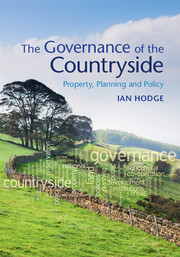Book contents
- Frontmatter
- Contents
- Preface
- Acknowledgements
- List of abbreviations
- Part I Introduction
- 1 The place of the countryside
- 2 Institutions, property and governance
- 3 Institutions in the countryside
- Part II Historical models
- Part III Governance under sectoral policies
- Part IV Alternative approaches to governance
- Part V Conclusions
- References
- Index
3 - Institutions in the countryside
from Part I - Introduction
Published online by Cambridge University Press: 05 February 2016
- Frontmatter
- Contents
- Preface
- Acknowledgements
- List of abbreviations
- Part I Introduction
- 1 The place of the countryside
- 2 Institutions, property and governance
- 3 Institutions in the countryside
- Part II Historical models
- Part III Governance under sectoral policies
- Part IV Alternative approaches to governance
- Part V Conclusions
- References
- Index
Summary
Give a man the secure possession of a bleak rock, and he will turn it into a garden; give him a nine years’ lease on a garden, and he will turn it into a desert…The magic of property turns sand into gold.
Arthur Young (1741–1820), 1787 journal entries 30 July and 7 November, published in Travels in France and Italy (1794)Nor is there much satisfaction in contemplating the world with nothing left to the spontaneous activity of nature; with every rood of land brought into cultivation, which is capable of growing food for human beings; every flowery waste or natural pasture ploughed up, all quadrupeds or birds which are not domesticated for man's use exterminated as his rivals for food, every hedgerow or superfluous tree rooted out, and scarcely a place left where a wild shrub or flower could grow without being eradicated as a weed in the name of improved agriculture.
John Stuart Mill (1848) Principles of Political Economy with some of their Applications to Social Philosophy, Book IV, Chapter VI3.1 Introduction
Because the character of the British countryside is essentially determined by the way in which its land and other resources are used, we need to consider the institutional arrangements that govern land management and decision-making. This chapter applies principles from Chapter 2 to examine the institutional arrangements for the ownership and occupation of land and the incentives for the management of the countryside. In later chapters we evaluate the more specific governance issues.
Most of the decisions that directly affect the rural environment are taken by the person or organisation that owns the land. Thus, the way in which the land is controlled and the interests of the landholder are critical to the way in which the countryside is used and developed. In this chapter we first look at the ways in which land is controlled and the rights associated with ownership. We then consider the incentives that private owners have to influence environmental quality. However, in many circumstances, land is held and used under alternative property regimes. Sometimes there is no single ‘owner’ and the land may be held and used by the state, by groups of individuals or by non-profit organisations, or the use of the land is shared between a landlord and tenant.
- Type
- Chapter
- Information
- The Governance of the CountrysideProperty, Planning and Policy, pp. 38 - 62Publisher: Cambridge University PressPrint publication year: 2016



